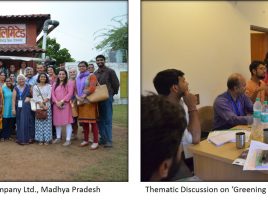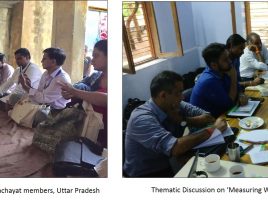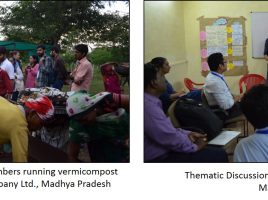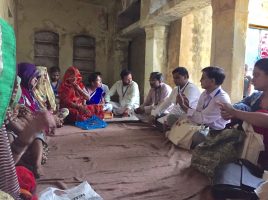Reducing Inequalities and Ensuring Access to Basic Needs
India is welcoming a trend of growth and development; at the same time the population is growing too. However, the standard of living is increasing only for a certain segment of people, environmental challenges are becoming evident, and access to resources is increasingly becoming inequitable. In order to make a transition towards a more just and sustainable society with a greener economy, India must invest in its people to ensure that they have equitable access to natural and financial resources or capital.
Growing inequality and unemployment, particularly among the young, hinders human potential and innovation. Thus, a greener economy explores opportunities for redistributing access to natural resources, financial capitals and knowledge systems, which is more resilient and inclusive.
For ‘investing in people’ multiple meanings have emerged. Most of the people associate investment only with money, and success of the investment is measured in terms of returns that we receive. However, during the discussions at TARAgram Yatra, it came out that ‘investment’ does not have only monetary associations, but also includes spending/allocation in terms of natural resources, knowledge capital, human resources etc. It was concluded that a ’by default’ inclination of investments towards infrastructure, and not people, had resulted in an imbalance in the society.
Access to Resources – Natural, Financial and Knowledge Capital
Ensuring an equal distribution of resources requires the identification of the needs of people. Many a times, the community adopts market’s needs as its individuals’ needs. However, it should be vice versa – individuals’ needs should be of prime importance, and only the surplus should be given to the market. In order to do so, communities are often heavily dependent on banks and informal loan lenders like sahukars, as they are not aware of their rights and the different facilities under various schemes. Access to traditional occupation is becoming extinct. Neither is enough encouragement provided, nor is the platform for accessing and enhancing traditional knowledge systems. This leads to lack of employment, thus resulting in loss of skills. Investment in quality of education is another key concern in terms of accessing knowledge systems. In the discussion, it came out that traditional knowledge systems and economic growth are already poles apart, and the incentives promoted by government often delink and widen the gap between the two.
Information Education Communication (IEC) is considered to be the most effective method for ensuring accessibility by making knowledge hubs accessible to people. For this purpose, duplication of beneficiaries under various schemes must be avoided. A common goal should be set up and, thus, an integrated scheme must be introduced to ensure the needs of people. Digitalisation of the database helps in monitoring groups and keeping a track of the progress of the systems. Also, documentation of the best practices is one of the key ways to preserve and enhance knowledge systems.
There are different ways to improve people’s access to resources. Diversification in terms of alternate livelihood should be explored. There is a need for strengthening the institutional building process, and thus, for regular and rigorous training of bank officers, government representatives and spreading awareness in the community to increase access to entitlements.
Decentralised Decision Making Process
In order to implement all of the above mentioned initiatives, there is a need to focus more on community drive, than on individual one. Moreover, the voice of the marginalised section of the society also needs to be heard and considered in the decision making process. Decentralisation of decision making is possible only if identification process of the right beneficiary is followed, social auditing is done by a third party regularly, and there is a continuous flow of knowledge.
Srijani Hazra
shazra@devalt.org
The views expressed in the article are those of the author’s and not necessarily those of Development Alternatives.







Leave a Reply